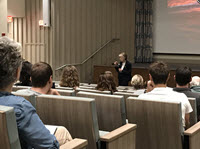
“I was not going to be stopped,” said Dr. Rita Colwell describing how she faced hurdles, many related to being a woman during her 60+ year science career, and blazed paths, including her being the first female director of the National Science Foundation. She spoke earnestly and enthusiastically to faculty, staff, and students gathered for the two-day Career and Leadership event at the University of Miami (UM) Rosenstiel School for Marine and Atmospheric Science (RSMAS).
“It is very important to fully engage women in science, energy, and technology because the country needs them, the world needs them,” said Colwell.
Professor Villy Kourafalou – Director of the UM “SEEDS (A Seed for Success)” program and Chair of the RSMAS “Diversity, Equity, and Inclusion Committee” – invited Dr. Colwell to be the Distinguished Lecturer at the 2018 lecture series that supports diversity and career development and success. Kourafalou knew that Colwell would inspire all scientists attending the event and leave a positive and lasting impression, but especially for the young women. And she did.
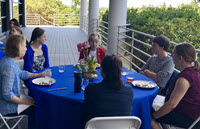
“It was incredibly inspiring to see a successful woman who has been in the field for so long speak about her research as well as the obstacles and successes she has experienced,” said UM graduate student Lela Schlenker. “I loved hearing her talk about meeting challenges and rising above sexist attitudes. She was such an inspiration.”
On day one, Colwell spoke about global infectious disease and its relationship with climate, oceans, and human health. She described her early work of computer coding with IBM punch cards and experiences in Bangladesh conducting cholera and genomics research, identifying specific bacterial strains in people’s gut. While Colwell spoke passionately about the science, she was equally as passionate about the people affected, evident when she described how the villagers learned to filter their drinking water that resulted in a 50% decrease in cholera cases.
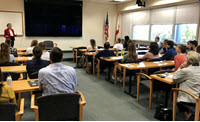
On day two, Colwell took the attendees on a historical journey as she described women in science from Galileo’s daughter to recent Nobel Prize winners. She discussed societal pressures that are not supportive of women entering science and engineering fields; however, she made a point to emphasize – particularly to the women in attendance – her persistence throughout her career, “If somebody tried to block my way, I went over, under, through the left or through the right.”
Afterwards, the audience asked questions about how male scientists can support female students and scientists (treat women equally, give women opportunities, students will be more productive and you will be rewarded), the role of good mentors (male or female), and work/life balance (go sailing to clear your mind, enlist the support of your partner/family). Other questions covered topics from ways to encourage more funding of interdisciplinary science programs to new skills students should acquire (genomics, IT, working with large data sets).
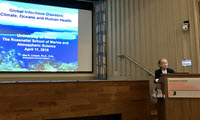
Colwell also encouraged attendees to participate in outreach and improve communicating their science effectively. She mentioned giving public presentations and participating in videos like the two Screenscope films Dispatches from the Gulf that documented the science and people involved with the Gulf of Mexico Research Initiative (GoMRI).
Professor Tamay Ozgokmen described the rapt attention displayed on everyone’s face as similar to watching a Hitchcock suspense movie and how Colwell captured their fascination with clarity and energy. “The way she expressed her memoirs revealed a lot of resilience, creativity, use of psychology, extraordinary intellect, combined with very hard, many decades of work. Nowadays, people like to do a little bit of everything, without going deep into any topic, but clearly, sustained focus and curiosity of science is at the core of Dr. Colwell’s enormous achievements.”
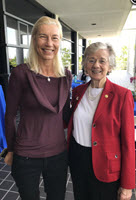
Professor Villy Kourafalou was thrilled with the audience’s overwhelming enthusiasm and the lively discussions at the networking events afterwards, but she was not surprised. “Bringing distinguished female scientists to RSMAS to talk about their amazing science achievements and their career pathways has been extremely rewarding. Rita Colwell, a larger-than-life scientist, graced us with her witty approach to life and science. It was a privilege to host her, and we are grateful for her generous time.”
- Rita Colwell is a Distinguished University Professor at the University of Maryland and Johns Hopkins University Bloomberg School of Public Health, Founder and Chair of CosmosID, Inc., and Chair of the GoMRI Research Board. She is the recipient of numerous national and international awards and honors, including 55 honorary degrees, and holds many leadership and advisory positions in U.S. Government and nonprofit science policy organizations, private foundations, and the international scientific research community.
- Villy Kourafalou leads a team of researchers, Ph.D. students, and postdocs at the UM RSMAS Department of Ocean Sciences. She is the co-Director of the Ocean Modeling and Observing System Simulation Experiments Center, lead for the Coastal and Shelf Modeling group; co-Chair of the international Coastal Ocean and Shelf Seas Task Team; and Principal or co-Principal Investigator of several GoMRI-funded projects.
- Tamay Ozgokmen teaches and advises Ph.D. students, post-docs, and researchers at the UM RSMAS Department of Ocean Sciences and is the Principal Investigator of the GoMRI-funded CARTHE consortium with over 44 co-Principal Investigators from 27 universities and research institutions.
- Learn more about the SEEDS program and the UM-based research consortia CARTHE and RECOVER.
************
The Gulf of Mexico Research Initiative (GoMRI) is a 10-year independent research program established to study the effect, and the potential associated impact, of hydrocarbon releases on the environment and public health, as well as to develop improved spill mitigation, oil detection, characterization and remediation technologies. An independent and academic 20-member Research Board makes the funding and research direction decisions to ensure the intellectual quality, effectiveness and academic independence of the GoMRI research. All research data, findings and publications will be made publicly available. The program was established through a $500 million financial commitment from BP. For more information, visit https://gulfresearchinitiative.org/.
© Copyright 2010-2018 Gulf of Mexico Research Initiative (GoMRI) – All Rights Reserved. Redistribution is encouraged with acknowledgement to the Gulf of Mexico Research Initiative (GoMRI). Please credit images and/or videos as done in each article. Questions? Contact web-content editor Nilde “Maggie” Dannreuther, Northern Gulf Institute, Mississippi State University (maggied@ngi.msstate.edu).
